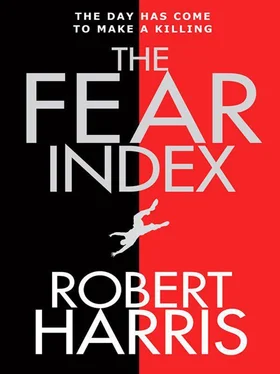Robert Harris - The Fear Index
Здесь есть возможность читать онлайн «Robert Harris - The Fear Index» весь текст электронной книги совершенно бесплатно (целиком полную версию без сокращений). В некоторых случаях можно слушать аудио, скачать через торрент в формате fb2 и присутствует краткое содержание. Жанр: Триллер, на английском языке. Описание произведения, (предисловие) а так же отзывы посетителей доступны на портале библиотеки ЛибКат.
- Название:The Fear Index
- Автор:
- Жанр:
- Год:неизвестен
- ISBN:нет данных
- Рейтинг книги:4 / 5. Голосов: 1
-
Избранное:Добавить в избранное
- Отзывы:
-
Ваша оценка:
- 80
- 1
- 2
- 3
- 4
- 5
The Fear Index: краткое содержание, описание и аннотация
Предлагаем к чтению аннотацию, описание, краткое содержание или предисловие (зависит от того, что написал сам автор книги «The Fear Index»). Если вы не нашли необходимую информацию о книге — напишите в комментариях, мы постараемся отыскать её.
The Fear Index — читать онлайн бесплатно полную книгу (весь текст) целиком
Ниже представлен текст книги, разбитый по страницам. Система сохранения места последней прочитанной страницы, позволяет с удобством читать онлайн бесплатно книгу «The Fear Index», без необходимости каждый раз заново искать на чём Вы остановились. Поставьте закладку, и сможете в любой момент перейти на страницу, на которой закончили чтение.
Интервал:
Закладка:
‘You promise me you’ll be careful?’ said Gabrielle, as the Mercedes pulled up.
Hoffmann reached behind Quarry and squeezed her shoulder. ‘I’m getting stronger by the minute. What about you, though? You feel okay, going back to the house?’
‘Genoud is sending someone round,’ said Quarry.
Gabrielle made a quick face at Hoffmann – her Hugo face, which involved turning down the corners of her mouth, sticking out her tongue and rolling up her eyes. Despite everything, he almost burst out laughing. ‘ Hugo has it all under control,’ she said, ‘don’t you, Hugo? As usual.’ She kissed her husband’s hand where it lay on her shoulder. ‘I won’t be stopping anyway. I’ll just grab my things and get over to the gallery.’
The chauffeur opened the door.
‘Hey, listen,’ said Hoffmann. He was reluctant to let go of her. ‘Good luck this morning. I’ll come over and see how things are going as soon as I can get away.’
‘I’d like that.’
He climbed out on to the pavement. She had a sudden premonition that she would never see him again, so vivid she was nearly sick. ‘You’re sure we shouldn’t both cancel everything and take the day off?’
‘No way. It’s going to be great.’
Quarry said, ‘Cheerio then, sweetheart,’ and slid his neat bottom over the leather upholstery towards the open door. ‘D’you know,’ he said, as he clambered out, ‘I think I might actually come and buy one of your thingamabobs. Go very well in our reception, I reckon.’
As the car pulled away, Gabrielle looked back at them through the rear window. Quarry had his left arm round Alex’s shoulders and was steering him across the pavement; with his right he was gesturing. She could not tell what the gesture meant, but she knew he was making a joke. A moment later they disappeared.
The offices of Hoffmann Investment Technologies revealed themselves to a visitor like the carefully rehearsed stages of a conjuring trick. First, heavy doors of smoked glass opened automatically on to a narrow reception barely wider than a corridor, low-ceilinged, walled by dimly lit brown granite. Next you presented your face to a camera for 3D recognition scanning: it took less than one second for the metric geometry algorithm to match your features to its database (during this process it was important to maintain a neutral expression); if you were a visitor, you gave your name to the unsmiling security guard. Once cleared, you were clicked through a tubular steel turnstile, walked down another short corridor and turned left – and suddenly you were confronted by a huge open space flooded with daylight: that was when it hit you that this was actually three buildings knocked into one. The masonry at the back had been demolished and replaced by a sheer Alpine ice-fall of frameless glass, eight storeys high, overlooking a courtyard centred round a jetting fountain and elaborate giant ferns. Twin elevators rose and fell noiselessly in their soundproofed glass silos.
Quarry, the showman and salesman, had been stunned by the concept the moment he had first been shown round the place nine months earlier. For his part, Hoffmann had loved the computer-controlled systems – the lighting that adjusted in harmony with the daylight outside, the windows that opened automatically to regulate the temperature, the funnels on the roof that drew in fresh air to remove the need for air-conditioning in all open spaces, the ground-source heat-pump system, the rainwater recycling unit with its hundred-thousand-litre holding tank used for flushing the lavatories. The building was advertised as ‘a holistic, digitally aware entity with minimal carbon emissions’. In the event of fire, the dampers would be shut off in the ventilation system to prevent the spread of smoke and the elevators sent to the ground floor to stop people boarding them. It was also, most important of all, connected to the GV1 fibre-optic pipe, the fastest in Europe. That clinched it: they took out a lease on the whole of the fifth floor. The corporate tenants above and below – DigiSyst, EcoTec, EuroTel – were as mysterious as their names. Nobody from one firm ever seemed to acknowledge the existence of anyone from another. Elevator rides passed in awkward silence, apart from when passengers stepped in and announced which floor they required (the voice-recognition system could differentiate between regional accents in twenty-four languages): Hoffmann, who made a fetish of privacy and loathed small talk, rather liked that.
The fifth floor was a kingdom within a kingdom. A wall of opaque and bubbled turquoise glass blocked off access from the elevators. To gain entry, as downstairs, it was necessary to present one’s relaxed countenance to a scanner. Facial recognition activated a sliding panel, the glass vibrating slightly as it rolled back to reveal Hoffmann’s own reception area: low cubes of black and grey upholstery stacked and arranged like child’s bricks to form chairs and sofas, a coffee table of chrome and glass, and adjustable consoles containing touch-screen computers on which visitors could browse the web while waiting for their appointments. Each had a screensaver stating the company’s rubric in red letters on a white background:
THE COMPANY OF THE FUTURE WILL HAVE NO PAPER
THE COMPANY OF THE FUTURE WILL CARRY NO INVENTORY
THE COMPANY OF THE FUTURE WILL BE ENTIRELY DIGITAL
THE COMPANY OF THE FUTURE HAS ARRIVED
There were no magazines or newspapers in the reception area: it was company policy that, as far as possible, no printed material or writing paper of any sort should pass the threshold. Of course, the rule could not be imposed on guests, but employees, including the senior partners, were required to pay a fine of ten Swiss francs, and have their names posted on the company’s intranet, each time they were caught in possession of ink and wood pulp rather than silicon and plastic. It was astonishing how quickly people’s habits, even Quarry’s, were changed by this simple rule. Ten years after Bill Gates had first preached the gospel of the paperless office in Business at the Speed of Light, Hoffmann had more or less brought it about. In a strange way he was almost as proud of this achievement as he was of any of his others.
It was embarrassing, therefore, for him to have to pass through reception with his first edition of The Expression of the Emotions in Man and Animals. If he had caught anyone else with a copy he would have pointed out that the text was readily available online via Project Gutenberg or Darwin. online. org, and asked sarcastically whether they considered themselves to be a quicker reader than the VIXAL-4 algorithm, or had trained their brains to do word search. He saw no paradox in his zeal to ban the book at work and to display it in rare first editions at home. Books were antiques, just like any other artefacts from the past. One might just as well reprimand a collector of Venetian candelabra or Regency commodes for using an electric light or a flush lavatory. Nevertheless he slipped the volume under his coat and glanced up guiltily at one of the tiny security cameras that monitored the floor.
‘Breaking your own rules, Professor?’ said Quarry, loosening his scarf. ‘Bit bloody rich.’
‘Forgot I had it with me.’
‘Like hell. Your place or mine?’
‘I don’t know. Does it matter? Okay – yours.’
To reach Quarry’s office it was necessary to cross the trading floor. The Japanese stock market would close in fifteen minutes, the European exchanges would open at nine, and already four dozen quantitative analysts – quants, in the dismissive jargon of the trade – were hard at work. None talked above a whisper. Most stared silently at their six-screen arrays. Giant plasma televisions with muted sound carried CNBC and Bloomberg, while beneath the TVs a glowing red line of digital clocks noiselessly recorded time’s relentless passage in Tokyo, Beijing, Moscow, Geneva, London and New York. This was the sound that money made in the second decade of the twenty-first century. The occasional soft clatter of strokes on a keyboard was the only indication that humans were present at all.
Читать дальшеИнтервал:
Закладка:
Похожие книги на «The Fear Index»
Представляем Вашему вниманию похожие книги на «The Fear Index» списком для выбора. Мы отобрали схожую по названию и смыслу литературу в надежде предоставить читателям больше вариантов отыскать новые, интересные, ещё непрочитанные произведения.
Обсуждение, отзывы о книге «The Fear Index» и просто собственные мнения читателей. Оставьте ваши комментарии, напишите, что Вы думаете о произведении, его смысле или главных героях. Укажите что конкретно понравилось, а что нет, и почему Вы так считаете.










